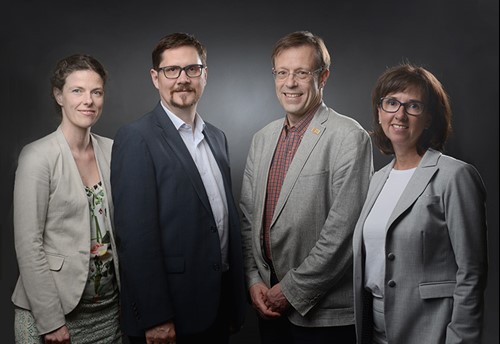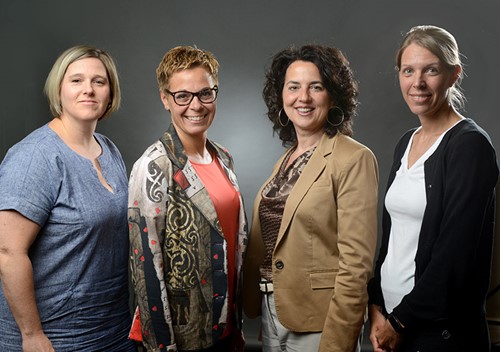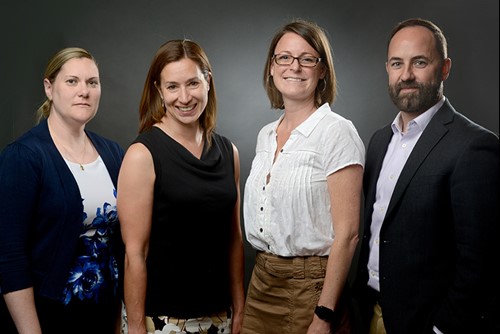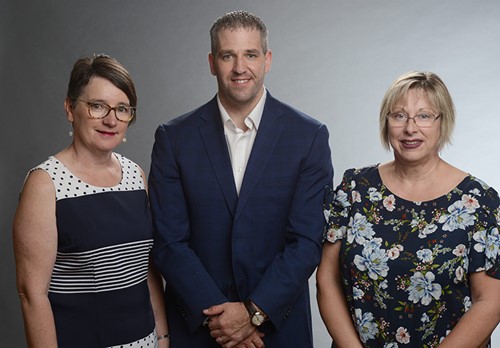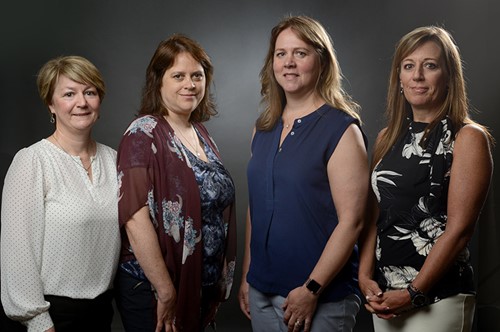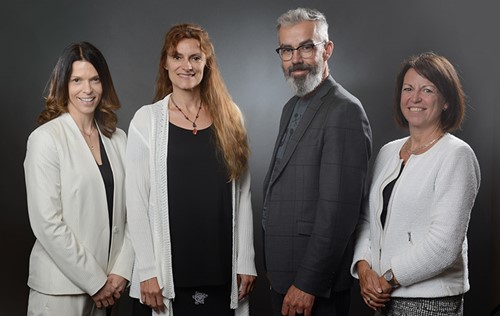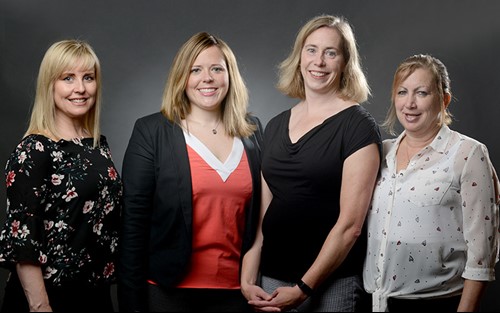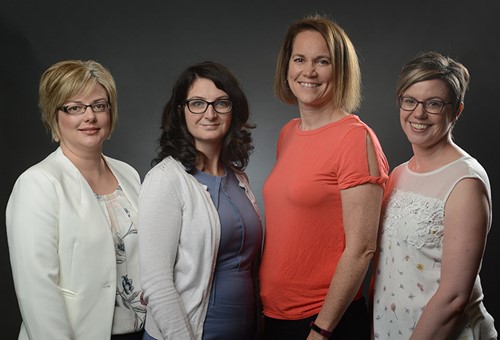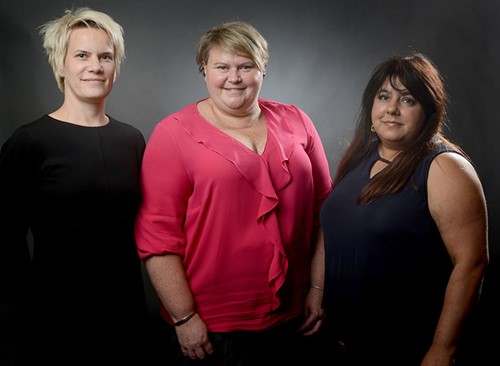2018 EXTRA Improvement Projects
Centre hospitalier universitaire de Québec (QC) - Université Laval (QC) / Centre intégré universitaire de santé et de services sociaux de la Capitale-Nationale (QC)/ Université Laval (QC)/ Réseau universitaire intégré de santé de l'Université Laval (QC)
- Dr Bruno Piedboeuf, Coordonateur clinique
- Mme Katia Boivin, Chef de services des activités d'enseignement
- M. Érik Plourde, Chef du service de l'enseignement médical
- Mme Marielle Lapointe, Adjointe au Vice-recteur et coordinatrice des sciences de la santé
Enhancing Support for Practitioners in Outlying Areas to Improve Access to Care
This project aims to improve employee retention and the quality of care provided by the health and social services practitioners who work in outlying regions. The team will conduct a current state analysis to pinpoint specific challenges for health professionals in these areas, as well as their need for continuing education and support for their professional practices. The selection criteria will consider the multidisciplinary aspect of the project, the need for integration of services, the needs of the populations served in these areas and the potential to use telehealth in certain cases.
Physicians will not be included in this project since their professional status and the rules governing their professional development are different. However, lessons learned from physician education can be used where relevant to other professionals in health and social services. Given the limited duration of this project, nurses will also not be included in the first phase.
The project team will conduct a current state analysis to pinpoint appeal and retention challenges for health professionals, as well as ensuring the appropriate expertise is available in the region. We will document barriers and then establish a framework to make use of various training methods, and will then test a specific project.
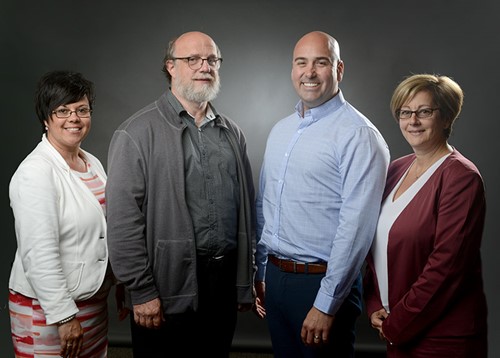
Centre intégré de santé et de services sociaux de la Montérégie-Centre (QC)
- M. Benoit Geneau, Directeur des programmes de santé mentale et dépendance
- Dr. Pierre Guay, Médecin psychiatre et médecin-conseil
- Mme Josée Fournier, Directrice asjointe des services multidisciplinaires - volet opérations
- Mme Maryse Poupart, Directrice des ressources humaines, des communications et des affaires juridiques
Mental Health, the Main Thrust of Organizational Performance
According to data from Montreal’s Institut universitaire de santé mentale, disability costs related to mental health now exceed those of cardiovascular disease and are becoming the fastest growing category of healthcare spending in Canada. This trend also impacts health professionals.
According to Professor Alain Marchand of the University of Montreal’s Fernand-Seguin Research Center (2009), a career in health and social services can contribute to the onset of mental health problems, but other factors, such as family dynamics, social networks, local communities and personality traits, may also play a role and can be difficult to disclose in the workplace.
Faced with the complex nature of mental health problems, organizations and their management staff are poorly equipped to offer alternative work arrangements to accommodate mental health issues. This improvement project seeks to develop and implement an organizational performance improvement strategy focused on mental health in the workplace, so that healthcare providers can deliver optimal care and services. The strategic model is based on three specific intervention aims:
- Ensure continued employment and productivity for staff dealing with a mental health issue or potentially affected by one;
- Identify and introduce mental health protection factors in the workplace and reduce psychosocial risks;
- Reduce the impact of stigma and discrimination associated with mental health issues in labour relations.
The intervention will focus on new employee integration, continued employment and reintegration following a leave in two clinical settings. It will be rooted in measures that have been initiated at the local and national levels in order to develop an integrated response model.
Centre intégré universitaire de santé et de services sociaux du Centre-Sud-de-l'île-de-Montréal (QC)
- Mme Nancie Brunet, Directrice adjointe qualité, risques et éthique
- Mme Nathalie Charbonneau, Directrice adjointe continuum en déficience physique 1re, 2e, 3e ligne
- Mme Julie Lauzon, Directrice adjointe, santé mentale jeunesse, réadaptation enfants et adolescentes
- Mme Isabelle Matte, Directrice adjointe de l'hébergement
Enhancing the Client Experience by Standardizing the Human Aspect of the Intake Process and Relationship, and the Continuity of Care and Service Pathways
This project aims to improve the experience of users and their families from three branches of the CIUSS: the Youth Programs Directorate (DJ), the Independent Living Support for Seniors Directorate (SAPA) and the Intellectual Disabilities, Autism Spectrum Disorders and Physical Disabilities Programs Branch (DI-TSA-DP). The interventions will include patients, families and community care partners to ensure care plans are aligned with patient life goals, preferences and experiential knowledge in all care decisions. They will also involve staff and executives in a variety of positions from these areas.
The approach will be rooted in the organization’s culture and values and be reflected in every action and decision. It involves promoting much more than client satisfaction; but also, a real commitment to patient and family personal, physical and mental well-being, as well as enhancing care for all.
Implementing and sustaining improvements for these groups will require the active engagement of all relevant staff and executives, helping them understand they can make a difference by caring and showing compassion in their interactions, and by making sure care and services are properly coordinated, especially during transitions.
Health and Social Services (YK)/ Yukon Hospital Corporation (YK)
- Ms. Amy Riske, Director, Care and Community
- Mr. Dallas Smith, Manager, Mental Wellness System Improvement Projects
- Ms. Laura Salmon, Director, First Nations Health Programs
- Ms. Stefanie Ralph, Executive Director of Patient Experience
Co-developed care plans supporting transitions of care for older adults
Our improvement project aims to co-develop an integrated care plan and process with a group of older adults who are users of the health and social services system. A small sample of older adults (Group 1) who representative of all areas of the Yukon, including a mix of clients from urban and rural areas, and who use two more healthcare services, will be selected. The sample will also include clients who are traditionally underserviced, or under supported, such as rural First Nations. The project team will work with these clients and their care and support providers (e.g. primary care, therapy, family) to ensure that all the areas important to the care of the client are captured.
The co-development of the integrated care plan tool and process will involve client questionnaires, story mapping, focus groups, case review, structured and informal interviews. Once the plan and process have been drafted, a pilot will be launched with Group 1 to further refine the tool and the process. The care plan would be accessible to—and updated by—all providers participating in the care of the client. The mechanisms for sharing and updating the care plan will be defined as part of the project. Once a final draft has been completed, a separate test group of clients (Group 2) will be chosen to further pilot the tool and the process, and identify readiness for spread and scale.
Health PEI
- Ms. Donna MacAusland, Program Development Lead, Primary Health Care
- Mr. Paul Young, Administrator for Community Hospitals West
- Ms. Anita MacKenzie, Manager Primary Care Network Queens East
Provincial Orthopedic Hip/Knee Assessment Clinic
Data shows that 75 percent of hip and knee referrals to orthopedic surgeons do not result in surgery. The Health PEI team will open a Centralized Orthopedic Assessment Clinic, staffed by a specially trained nurse practitioner who will triage all hip and knee referrals with a goal to shorten the current 12-14 month wait to see an orthopedic surgeon.
Patients requiring surgical intervention would be referred to the next available orthopedic surgeon or the surgeon of their choice. They would also have their condition optimized in anticipation of surgery, thereby reducing length of stay. Patients that do not require surgical intervention would be offered other treatment, when appropriate, such as joint injection, physiotherapy and nutritional planning; thereby improving their condition and keeping them out of the orthopedic surgeon’s office.
Health PEI
- Ms. Marion Dowling, Chief of Nursing, Allied Health and Patient Experience
- Mrs. Kelly Wright, Director of Nursing and Operations, Prince County Hospital
- Ms. Leslie Warren, Provincial Manager, Acute Care Mental Health and Addictions
- Mrs. Edna Miller, Administrator, Community Hospitals East
Integrating Nursing Sensitive Patient Outcome Documentation in Acute Care
The Canadian Health Outcomes for Better Information and Care (C-HOBIC) data set was endorsed as a Canadian approved standard in January 2012.
It is evidence-based and when implemented demonstrates improved patient outcomes. Health PEI proposes to integrate the C-HOBIC acute care nursing data set into clinical documentation within the electronic clinical information system currently in place across PEI hospitals. It will be implemented in 1-2 test sites and then spread to all acute care sites. Integration will capture and improve nursing sensitive assessments and interventions by providing reportable, measurable and comparable information about the patient's condition on admission and at discharge. This information will be sharable and transferrable between acute care, home care, long term care and primary care when a patient is admitted or discharged to these services from acute care.
This improvement project will result in a change in nursing documentation at admission and discharge in acute care. It will incorporate input from frontline staff, patient and family advisors and steering committee members to accommodate patient flow and work flow; design, change and implement documentation in the clinical information system, educate and prepare staff for the change; and measure/evaluate the success and sustainability of the improvement.
Ministère de la santé et des services sociaux (QC)/ Centre intégré universitaire de santé et de services sociaux de la Mauricie-et-du-Centre-du-Québec (QC)
- M. Daniel Garneau, Directeur, Direction des services en déficience et en réadaptation physique
- Mme Natalie Rosebush, Directrice, Direction générale adjointe des services sociaux et des services aux aînés
- Mme Lyne Girard, Directrice générale adjointe programmes sociaux et réadaptation en déficience intellectuelle, trouble du spectre de l'autisme et déficience physique
- Mme Jacinthe Cloutier, Directrice adjointe services spécifiques et spécialisés Di-TSA adulte
An Integrated Network of Socio-Occupational and Community Services
Continuity of care is closely linked to the timely intervention of all relevant network stakeholders (health and social services, education, labour and community organizations) to better support users and encourage their full participation in society. The Centre intégré universitaire en santé et services sociaux (CIUSSS) de la Mauricie et du Centre-du-Québec will examine the levels of service integration with partners and implement an integrated network of complementary socio-occupational services that is tailored to meet individual patient profiles and needs, as well as to offer better continuity of care.
These measures will help ensure that users receive the right care, at the right time, by the right people. They will also promote stakeholder accountability based on their role in the continuum of care. This project includes an implementation assessment of users (number to be determined) to identify the contribution of each local network partner to each patient’s care. The goal is to improve access and ensure a smooth flow of users through the various transitions between services and organizations in the catchment area, as well as care coordination among stakeholders.
Nova Scotia Health Authority (Nova Scotia)
- Ms. Alissa Decker, Program Manager, Bone and Joint Team & Orthopedic Assessment Clinic
- Mrs. Lisa MacDonald, Rehabilitation Services Manager
- Mrs. Sally Blenkhorn, Manager Rehabilitation Services and Hip and Knee Clinic
- Dr. Marcy Saxe-Braithwaite, Senior Director, Perioperative/Surgical Services
Optimizing Access to Joint Replacement Surgery in Nova Scotia
In Nova Scotia, the wait time for total knee replacement is approximately 457 days and 388 days for total hip replacement. The goal of this improvement project is to reduce wait times for surgical consultation for Joint Replacement Surgery (JRS) from referral to surgical consultation (Wait 1). Currently the national benchmark for Wait 1 is 90 days.
Common improvement approaches that have worked in other jurisdictions have included: standardized provincial care pathways for JRS, centralized referral intake processes, electronic methodologies for data collection and evaluation, and establishing ongoing mechanisms for patient and family engagement to ensure care pathways and outcomes are in line with patient expectations. In April 2011, Eastern Health in St John’s NL achieved a 71 percent decrease in Wait 1 through the implementation of a centralized referral intake system, which allowed for formal data collection processes to inform further areas for focused improvement.
Our team hope to implement similar strategies to improve our Wait 1 times, and eventually Wait 2 times from surgical decision to surgery date. Our proposed provincial pathway will include: a centralized referral intake process and data collection, standardized assessments and criteria to determine surgical candidacy and level of urgency, pre-surgical preparation and optimization of JRS candidates.
Nova Scotia Health Authority (Nova Scotia)
- Ms. Bethany McCormick, Senior Director, Planning, Performance & Accountability
- Ms. Noella W. Whelan, Professional Practice Leader, Interprofessional Practice and Learning
- Ms. Nancy MacConnell-Maxner, Director, Interprofessional Practice & Learning, Northern Zone
- Ms. Nicole Lukeman, Director Policy and Planning Acute Medicine Services
Applying evidence based assessment to improve patient care models
Our improvement project will integrate qualitative and quantitative evidence to assess model of care, as well as quality improvement and system drivers, to inform decision making and service planning. The evidence to inform decision-making will include: 1) patient and population needs; 2) provider requirements (experience, staff mix, processes); and 3) system level factors (political, socioeconomic and operational context).
We will focus on a rural acute medicine pilot unit which, the evidence suggests, have a mismatch of patient population need to the level of care that is currently provided including inter-professional staff mix, unit processes, and other resources. In addition, there is instability of the health human resources, patient flow challenges, and opportunities to improve transitions in care.
The project will use a continuous improvement and planning process focused on three key phases: 1) identifying the needs of the patient population to inform the service level required, 2) requirements will guide the design of the interprofessional team, resources and processes within the unit, and 3) regular evaluation of patient and system level outcomes to signal when there is a match or mismatch between the patient population and service model and a need for re-assessment. Broad stakeholder engagement of staff, physicians, patients and families will be integral within the process. The project will work with local stakeholders to develop and implement a change management and implementation plan in response to service planning.
Vancouver Coastal Health (BC)
- Mrs. Sujata Connors, Director, Community & Family Health
- Ms. Kim Markel, Manager, Acute Care, Powell River
- Ms. Lauren Tindall, Director, Sunshine Coast
Optimal, sustained access, flow and transitions in rural sites
Transitional care is defined as “a set of actions designed to ensure the coordination and continuity of care received by patients as they transfer between different locations or levels of care” (Parry, Mahoney, Chalmers & Coleman, 2008, p. 317). When a patient’s transition from the hospital to home is less than ideal, the repercussions can be devastating and may include unnecessary hospital admissions and readmissions, adverse medical events and even mortality. Effective discharge planning is required to ensure that patients are cared for in the right place at the right time.
Our project is focused on improving the flow of care across Vancouver coastal sites which will include the development of a shared vision to guide planning for an effective, sustainable improvement. Collaboration and cooperation are essential on issues related to access, flow and capacity. Project working groups will be made up of key stakeholders impacted by patient flow, including patients, their families, acute/community staff and leadership. Staff will share their experiences and concerns by engaging in the inquiry process to gain a clearer understanding of the situation and to formulate appropriate solutions to the challenges they are facing.
